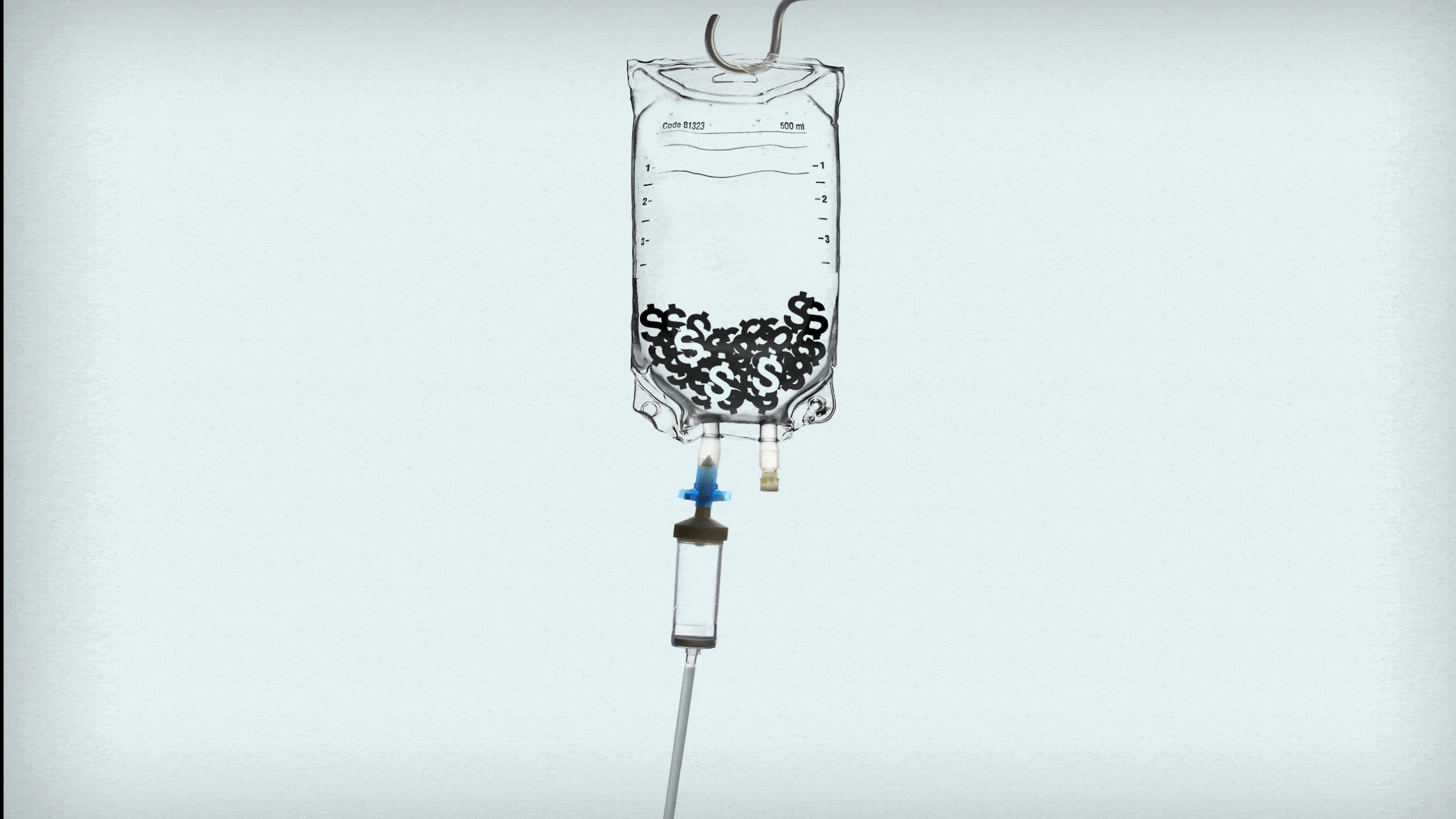

First you need to know why I needed Obamacare to begin with. Back in 2009, I worked as a manager for Starbucks and had great medical benefits. But in a big round of lay-offs, I lost my job. It would've cost $600 a month to continue my coverage through COBRA, and I just couldn't afford that. So I went without insurance instead.
I didn't want to wallow, so I took the layoff as an opportunity to go back to college, and enrolled in a one-year business management program so I could start my own small bookkeeping company. My husband is a small business owner too (he runs a trucking operation), and we love our jobs. But being self-employed means we don't get employer-based health insurance, and buying insurance wasn't an option for me: I have a pre-existing condition. I have asthma. I've had it my entire life.
This one inhaler I need can cost as much as $700 for a single month's supply. That plus my other medication to prevent asthma attacks was just way too expensive when I was uninsured, so I stopped taking them altogether. If I was really sick, my only option was the emergency room.
Then Obamacare came. I live in Kent, Washington, and we have a great state-run exchange here. And because of Medicaid expansion, my family now qualified. We enrolled in 2014—I got a primary care doctor and scheduled a new patient exam immediately and we put together a plan for my asthma care. I was saving so much money, being able to access preventative care instead of just relying on the ER when times got really bad, and my health was so much better.
And then, in August 2016, I felt a lump.
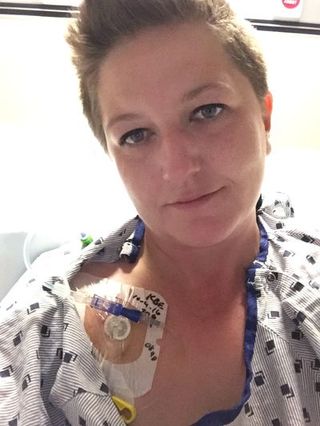
Jennifer on her first day of chemotherapy
Honestly I wasn't all that worried about it at first—I have naturally lumpy, dense breast tissue and get benign lumps all the time that swell and get painful during my periods. Plus I was in a great place in my life at that time. We had just moved and were really enjoying our new house, business was picking up, and we had some money in savings for the first time ever. But I went ahead and scheduled an appointment with my doctor, just to be safe.
Three days later, on September 9, 2016, the doctor called and said it was breast cancer. Everything changed right then and there.
Stay In The Know
Marie Claire email subscribers get intel on fashion and beauty trends, hot-off-the-press celebrity news, and more. Sign up here.
I was diagnosed with invasive ductal carcinoma. I had a 4-centimeter tumor that was starting to spread to my lymph nodes and my chest. It would have spread into my lungs if we hadn't caught it when we did. And we wouldn't have, if I hadn't had insurance. I wouldn't have had the money or the means. I know a lot of women who do that, too, who say, "Well there's nothing I can do about it," so they just ignore it and hope it goes away.
It's all been a whirlwind for me since then. Tests and biopsies and MRIs and scans and ultrasounds. Everything happened so quickly. I met my surgeon and my medical oncologist and radiologist. During the radiologist's exam, he found a lump in my neck: papillary thyroid cancer. So not only did I have breast cancer, but I had thyroid cancer too. My surgeon, Dr. Heather Wheeler, said she had never had a patient with both at the same time.
In early October, I started chemotherapy. I did six rounds of a very strong chemo regimen every six weeks to try to dissolve the cancer because it was so large. My understanding is that doctors are now trying to avoid chemotherapy because it's so debilitating for the patients, but my doctors wanted to try to treat the cancer before surgery because of its size.
Chemo was the worst. I don't know how people keep their jobs. Let me throw that out there. I'm self-employed so I was able to rearrange things with my clients, but it wasn't easy. I lost a couple. There were always two weeks of not feeling good and then a week that I could tolerate before starting all over again with the next round of chemo. I mostly just worked when I felt good, and dragged myself to do the minimum when I had no other choice. I didn't want to let my clients down that stuck with me during my battle.
I turned 40 in the middle of all that. I was ten days out from my most recent chemo, which is the absolute low point as far as blood cell count and energy, so my husband and I stayed home and cooked dinner. Birthdays—even big ones—are just another thing you miss out on when you're going through this.
I finished chemo in January of this year. Fortunately, I had a very good response. Then I had my thyroid removed in February, and earlier this month I had a left-side mastectomy and a couple of lymph nodes taken out. All the treatment I've received would have cost me about $500,000 if I didn't have coverage.
I'm still in shock that this all happened in the relatively tiny period of time I was covered by Obamacare. I was just so fortunate. The doctors and the insurance company didn't hold back any treatment or say, "She's on Medicaid so don't give her the best drugs." I got the best treatment and the best care. I wish that for everyone in this country: that they can get the treatment they need when they need it.
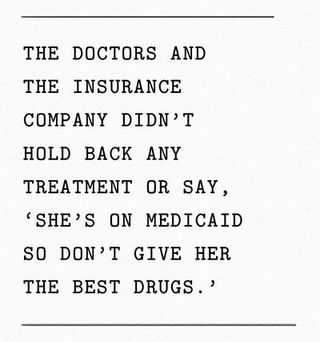
On March 8, my daughter's 18th birthday, my surgeon called to say I was clear. It looks like the cancer is gone. It was pretty cool to tell my daughter that on her birthday. And now she wants to be an oncologist. That's her new life goal because she's seen firsthand what medicine can do.
But the day before, on March 7, Republicans announced their new plan: the American Health Care Act (AHCA). This Thursday, the House of Representatives will be voting on it.
If they outright repeal the Affordable Care Act without replacing it, which they've discussed as an option, that would be the worst case scenario for me. Medicaid expansion would go away. The mandate to cover pre-existing conditions would go away. It would be devastating.
In the GOP's current proposal, which would replace Obamacare, they are keeping the requirement that would force insurance companies to treat those with preexisting conditions the same as those without. But the bill also phases out Medicaid expansion by 2020, and some even want to move up the end of expansion to 2018. That means I would only have 9 more months of coverage, and that's definitely hard on me. I'm scared.
Being uninsured is not an option for me anymore. My HER2+ cancer subtype has a very high rate of recurrence—only 7 or 8 percent of all HER2+ patients ever experience total remission—so I have to keep my chemo port for another year. I'll still be on targeted chemotherapy through the end of September. I get treatment every three weeks.
If I lose my coverage, I'd have to pay at least $15,000 for each treatment, which is money I don't have.
It's also very important that I get a yearly MRI to try and catch a recurrence early. On top of that, I'll have to have another surgery to remove the chemo port and replace the tissue expander I have currently with the actual breast implant for reconstruction. I'll be on thyroid replacement medication for the rest of my life. I have to see an endocrinologist and have labs done constantly to make sure my levels are good. She will be playing with my medication dosage until we get my levels within a normal range. I hear it's a process. Also, I still need my asthma inhaler, which keeps me breathing.
The money it would take to do all this on my own is impossible. I could pick up a part-time job to try to help cover the premium costs, or give it all up and look for a job with employer-based coverage, but even then I'd just be hoping I don't get sick again so that I can keep my job and my insurance.
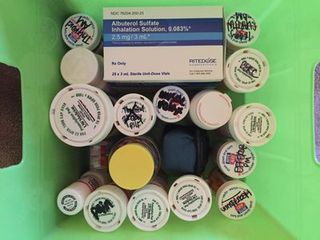
The collection of medication Jennifer must take to control her two cancers as well as her asthma.
I hope I don't have to do that. I love being a business owner. As a bookkeeper, I keep other businesses in business. That makes me proud.
But more than anything, I hope I don't have to feel like my life is in danger because of my country's politics.
My only wish when I was first diagnosed was to make it through this long enough so I could send my daughter off to college. I lost both my parents when I was young—my dad when I was 15 and my mom when I was 24—and I don't want that to be my daughter, without a mom, feeling like she's just floating through life.
I'm not just a number or a figure. I'm a mom. I'm a wife. I coach softball and give swim lessons. I own a business. I pay taxes. I contribute.
Women are so tough. We're all contributing to our society and our churches and our little leagues and being team moms. We're the ones who continue to go out there and do everything we can while we're battling everything else.
There are a lot of me's out there. There are so many people in the world who are just doing their best and trying to be a part of it all. I'm not asking for a hand-out, I just got dealt what I got dealt.
If we all stopped thinking about our own little bubbles and thought about how things affect the greater good, we would realize how important every single person is in this intricate society of ours. I'm one of us. And I hope I stay that way.
Editor's Note: MarieClaire.com contacted Jennifer's representative in the Senate, Washington state Democrat Patty Murray—who is also the ranking member of the Health, Education, Labor and Pensions Committee—for comment. Senator Murray told MarieClaire.com the following upon learning about Jennifer and her story:
"Jennifer puts a face on the tens of millions of people who are counting on healthcare coverage through the Affordable Care Act. There's Medicaid for those who need it, and the ability to buy it for others. It's unbelievable to me that Republicans, in a rush to fulfill a campaign promise, are treating Jennifer like she doesn't exist.
Any of us on any day could be Jennifer, going about our day, and then we lose our job, lose our insurance, and get a diagnosis. And this is who ACA repeal really hurts.
When Republicans say that their plan is making it easier for people to buy health care, I hope they look at the details of Jennifer's story. How is she going to buy health care if they throw out her Medicaid? She has no way to move forward.
Women don't just talk about themselves—she's saying, 'This happened to me but I'm fighting to make sure this doesn't happen to anyone else.' Jennifer has the courage to share her story publicly so she can make a difference. An investment in her is an investment in all our futures."
If you want to support Jennifer, tweet at your congressional representative (find him or her here) with a link to this story and the hashtag #ProtectACA.
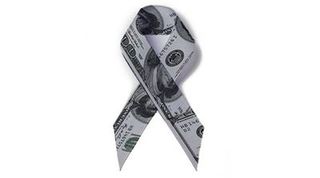
Jennifer Gerson is a Maggie Award-winning journalist whose reporting on reproductive rights, women's health, and sexual violence regularly appears in Cosmopolitan, as well as The Guardian, Yahoo, Allure, Teen Vogue, Mic and other national publications.
-
 Meryl Streep Reveals That Skinnydipping at 5 O'Clock In the Morning Is Something Her ‘Big Little Lies’ Co-Star Nicole Kidman Apparently Enjoys
Meryl Streep Reveals That Skinnydipping at 5 O'Clock In the Morning Is Something Her ‘Big Little Lies’ Co-Star Nicole Kidman Apparently EnjoysStreep presented Kidman with a lifetime achievement award on Saturday, and said it was “impossible not to be in awe of her" (referring more to her work than her early morning dips in the Pacific).
By Rachel Burchfield Published
-
 Katie Holmes Finds the Least Basic White Button-Down
Katie Holmes Finds the Least Basic White Button-DownHers has a playful illustrated twist.
By Halie LeSavage Published
-
 There’s A Poignant Reason Why Prince Harry and Meghan Markle’s Upcoming Visit to Nigeria Will Be Especially Meaningful to Them
There’s A Poignant Reason Why Prince Harry and Meghan Markle’s Upcoming Visit to Nigeria Will Be Especially Meaningful to ThemThe couple will travel there next month, following a stop for Harry in the U.K. to mark the Invictus Games’ 10-year anniversary on May 8.
By Rachel Burchfield Published
-
 36 Ways Women Still Aren't Equal to Men
36 Ways Women Still Aren't Equal to MenIt's just one of the many ways women still aren't equal to men.
By Brooke Knappenberger Last updated
-
 How New York's First Female Governor Plans to Fight for Women If Reelected
How New York's First Female Governor Plans to Fight for Women If ReelectedKathy Hochul twice came to power because men resigned amid sexual harassment scandals. Here, how she's leading differently.
By Emily Tisch Sussman Last updated
-
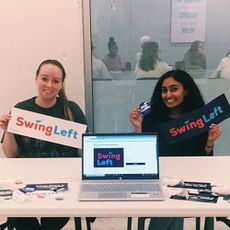 Why the 2022 Midterm Elections Are So Critical
Why the 2022 Midterm Elections Are So CriticalAs we blaze through a highly charged midterm election season, Swing Left Executive Director Yasmin Radjy highlights rising stars who are fighting for women’s rights.
By Tanya Benedicto Klich Published
-
 Tammy Duckworth: 'I’m Mad as Hell' About the Lack of Federal Action on Gun Safety
Tammy Duckworth: 'I’m Mad as Hell' About the Lack of Federal Action on Gun SafetyThe Illinois Senator won't let the memory of the Highland Park shooting just fade away.
By Sen. Tammy Duckworth Published
-
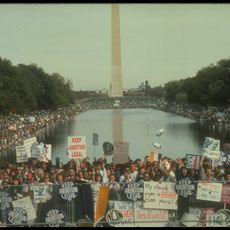 Roe Is Gone. We Have to Keep Fighting.
Roe Is Gone. We Have to Keep Fighting.Democracy always offers a path forward even when we feel thrust into the past.
By Beth Silvers and Sarah Stewart Holland, hosts of Pantsuit Politics Podcast Published
-
 The Supreme Court's Mississippi Abortion Rights Case: What to Know
The Supreme Court's Mississippi Abortion Rights Case: What to KnowThe case could threaten Roe v. Wade.
By Megan DiTrolio Published
-
 Sex Trafficking Victims Are Being Punished. A New Law Could Change That.
Sex Trafficking Victims Are Being Punished. A New Law Could Change That.Victims of sexual abuse are quietly criminalized. Sara's Law protects kids that fight back.
By Dr. Devin J. Buckley and Erin Regan Published
-
 My Family and I Live in Navajo Nation. We Don't Have Access to Clean Running Water
My Family and I Live in Navajo Nation. We Don't Have Access to Clean Running Water"They say that the United States is one of the wealthiest countries in the world. Why are citizens still living with no access to clean water?"
By Amanda L. As Told To Rachel Epstein Published